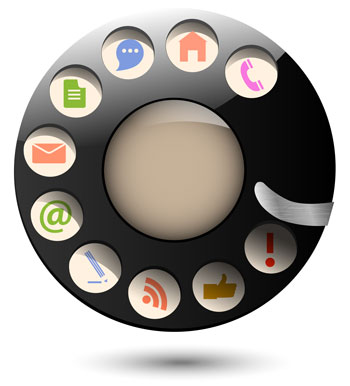Choosing the Best Web Browser for You
Since there are so many available, you may have a difficult time choosing the best web browser for you. Since they each have unique advantages and disadvantages, it can become overwhelming to find exactly what you’re looking for. Therefore, we put together this handy guide to help you find the best web browser (for you).
Things to consider
When choosing a browser, you should decide which factors are most important to you. Since everyone has their own priorities, certain considerations will be more important to you than someone else. You should probably choose 2 or 3 aspects to focus on, rather than expecting a perfect match on every point.
- Speed
- Customization
- Extensions / Addons
- Bandwidth
- OS Compatibility
- Device Compatibility
- Developer Tools/Needs
 Google Chrome
Google Chrome
Google Chrome is probably the more secure web browsers around. Chrome offers extras such as: Site verification, On-page translation, Incognito Mode, and multiple tab organization.
Speed – Chrome has fast boot up and loading times.
Customization – Chrome lets you customize your dashboard
Extensions – Chrome offers a variety of extensions
OS Compatibility – Chrome supports most Windows, Mac, and Linux systems.
Device Compatibility – Chrome Mobile supports some Android phones, iPads, and iPhones. Chrome does not support Blackberry or Windows phones.
Developer Tools/Needs:
- Good support of HTML5
- Each tab is a self contained process. This means that if one page starts to lag, Chrome can isolate the problem rather than crashing outright.
- Chrome offers developer tools for programmers
- Plugins are easy to code using only HTML, CSS, and JavaScript
 Mozilla Firefox
Mozilla Firefox
Mozilla Firefox has a simple interface with one-click buttons. Firefox offers extras such as: Firefox Hello (A video chat service compatible across browsers), and “Crash Protection” for plugins to automatically restart after crashing. Because Firefox adheres strictly to the W3C standards, it remains one of the most universally accessible browsers on the market.
Speed – While Firefox is fast and getting faster, Chrome is still in the lead.
Customization – Firefox has an “Awesome Bar” that learns from your Internet searches and finds content tailored for you. They also offer themes to customize the look of the browser.
Add-Ons – Firefox offers a variety of add-ons
OS Compatibility – Firefox supports most Windows, Mac, and Linux systems.
Device Compatibility – Firefox Mobile supports some Android devices. Firefox does not support iPads, iPhones, Blackberries, or Windows Phones.
Developer Tools/Needs– Add-ons use HTML, CSS, and JavaScript.
 Opera
Opera
While Opera is known for speed, another cool feature is it’s easy navigation using Opera Mouse.While clicking and holding down your mouse button you can move the mouse back and forth to jump pages, or up and down to scroll. Most noteworthy, it now comes with a built-in free VPN client for secure browsing.
Speed – Opera is the fastest browser because of it’s use of Carakan JavaScript
Widgets – Opera offers widgets that run on Windows, Mac, and Linux desktops
Bandwidth – Opera offers Opera Turbo that uses less bandwidth
OS Compatibility – Opera supports most Windows, Mac, and Linux systems.
Device Compatibility – Opera Mobile/Mini supports most Android devices. Opera does not support iPads, iPhones, Blackberries, or Windows Phones.
Developers Tools/Needs – Widgets have tools for easy coding
 Safari
Safari
Safari is optimized for Mac users. It features a favorites and bookmarks bar. Another great feature is its reader mode, which can render pages in an easy to read text-only format.
Speed – While Safari is pretty fast, it still lags far behind Chrome.
Extensions – Safari has extensions but not as many – more are coming. While we wait, the ones available so far are pretty useful.
OS Compatibility – Safari is geared towards Mac users but some versions do work on Windows. Safari does not support Linux.
Device Compatibility – Mobile Safari supports most iPads and iPhones. Safari does not support Android, Blackberry, or Windows Phones.
Developer Tools/Needs – Safari uses webkit which may appeal to developers, and it is pushing HTML5.
 The Death Of Internet Explorer
The Death Of Internet Explorer
Finally, there is a good reason why I left this Browser out of the comparison. Since January 12th, 2016, Microsoft no longer supports any version of Internet Explorer except 11. Consequently, you should uninstall IE from your system immediately. Because Microsoft won’t release any new security patches, exploits will go unfixed. Furthermore, leaving outdated software on your system potentially opens up doors for hackers.
Sources:
All Browser Logos from https://en.wikipedia.org/wiki/Main_Page
Learn more specifics about Device compatibility: Cross Browser Testing.
Developer Browser Cross-Compatibility Tools
Are Browser Requirements Okay?
 It’s Not The 90’s… Browser Requirements Are Not Okay
It’s Not The 90’s… Browser Requirements Are Not Okay
Every so often we still run into a website that tells us that it is best viewed with a certain browser, such as Internet Explorer. Or worse, the message informs us that we cannot use a service on the site without using a particular browser. While there are a few cases that this may be warranted, such as the most up-to-date version of a browser, generally it’s not poor website practice to tell a website visitor they need a certain browser to use a website. A website should be built for all possible technology.
There Are A Few Reasons Browser Requirements Are Not Okay
1. Lots of Devices
Once upon a time you probably viewed the internet using a PC, or maybe a Mac. Available technology was somewhat limited. You could probably install a given browser if a site required it. However, these days a person may be looking at a site from any number of devices and from one of dozens of browsers. The ‘required browser’ may not be an option to them.
2. Mobile-Friendly
Not only do modern internet users expect a website to work on their own computer and browser of choice, but they fully expect a website to be easily viewed on mobile devices and tablets. If your site is not usable with Firefox or Chrome, the likelihood of its use on a mobile device is greatly reduced. And you want your site mobile-friendly.
3. Technology is Better
In the late ‘90s, we were somewhat limited by both bandwidth and what technology we could use to display websites. Browsers often differed dramatically in how they rendered a given piece of code. While that is still sometimes the case, technology is much improved in all major browsers. Getting them to display similarly is not as much the challenge as it once was.
4. Loss of Customers
Any time you place a barrier between your website and your customer, you’re going to lose people who would otherwise be using the website and your service. Its better to put the programming time into setting up a website to be usable for all devices. If your website does not appear correctly on all devices its time to call in a professional website development company like Appletree MediaWorks to fix your website.





